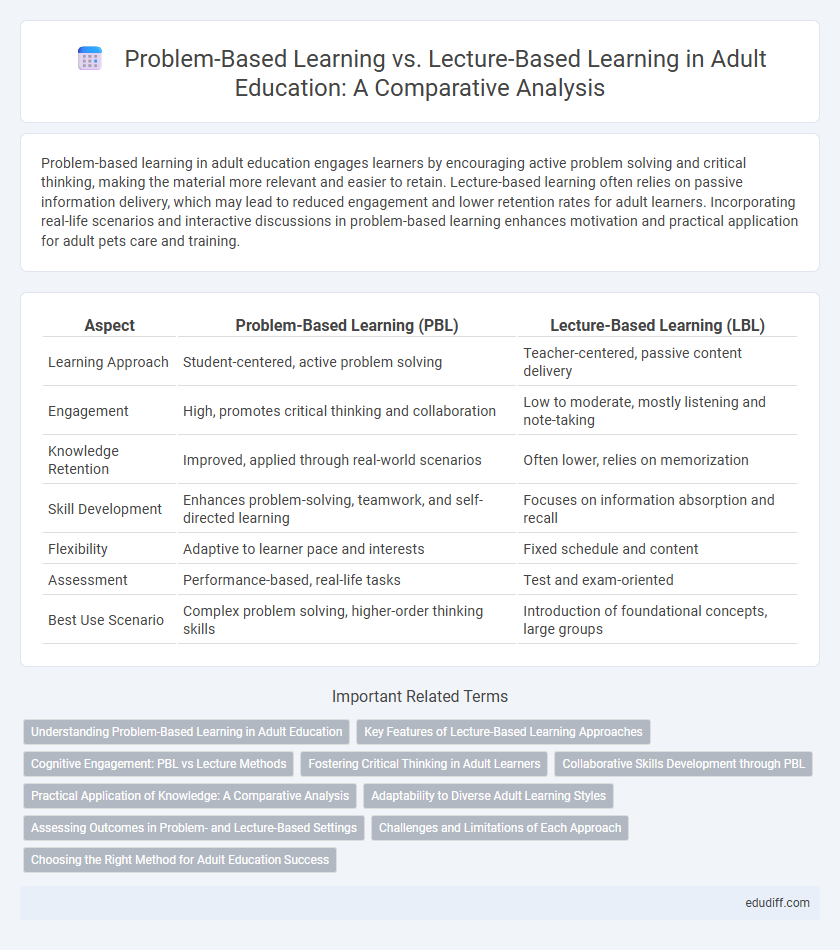Problem-based learning in adult education engages learners by encouraging active problem solving and critical thinking, making the material more relevant and easier to retain. Lecture-based learning often relies on passive information delivery, which may lead to reduced engagement and lower retention rates for adult learners. Incorporating real-life scenarios and interactive discussions in problem-based learning enhances motivation and practical application for adult pets care and training.
Table of Comparison
| Aspect | Problem-Based Learning (PBL) | Lecture-Based Learning (LBL) |
|---|---|---|
| Learning Approach | Student-centered, active problem solving | Teacher-centered, passive content delivery |
| Engagement | High, promotes critical thinking and collaboration | Low to moderate, mostly listening and note-taking |
| Knowledge Retention | Improved, applied through real-world scenarios | Often lower, relies on memorization |
| Skill Development | Enhances problem-solving, teamwork, and self-directed learning | Focuses on information absorption and recall |
| Flexibility | Adaptive to learner pace and interests | Fixed schedule and content |
| Assessment | Performance-based, real-life tasks | Test and exam-oriented |
| Best Use Scenario | Complex problem solving, higher-order thinking skills | Introduction of foundational concepts, large groups |
Understanding Problem-Based Learning in Adult Education
Problem-based learning (PBL) in adult education emphasizes active problem-solving and critical thinking, fostering deeper comprehension and practical application of knowledge. Unlike lecture-based learning, which centers on passive information delivery, PBL engages learners in real-world scenarios, enhancing motivation and retention. Studies show adults in PBL environments develop stronger analytical skills and greater autonomy, aligning with their experiential learning needs and professional development goals.
Key Features of Lecture-Based Learning Approaches
Lecture-based learning emphasizes instructor-centered delivery, where information is presented systematically to large groups, facilitating efficient content coverage. This approach relies heavily on verbal communication, structured note-taking, and passive reception, often prioritizing theoretical knowledge over practical application. Its key features include a fixed curriculum, limited interaction, and assessment methods focused on memorization and comprehension.
Cognitive Engagement: PBL vs Lecture Methods
Problem-based learning (PBL) significantly enhances cognitive engagement by requiring learners to actively solve complex, real-world problems, promoting critical thinking and deeper understanding. Lecture-based learning tends to emphasize passive information reception, limiting opportunities for interaction and active mental processing. Studies demonstrate that PBL participants show higher retention rates and improved problem-solving skills compared to those in traditional lecture settings.
Fostering Critical Thinking in Adult Learners
Problem-based learning (PBL) explicitly fosters critical thinking in adult learners by engaging them in real-world scenarios that require analysis, evaluation, and problem-solving, whereas lecture-based learning predominantly delivers information passively, limiting opportunities for active cognitive processing. Research indicates that PBL enhances higher-order thinking skills by encouraging collaborative inquiry and reflective judgment essential for adult education. The interactive nature of PBL aligns with adult learners' intrinsic motivation to apply knowledge practically, resulting in deeper understanding and retention compared to traditional lectures.
Collaborative Skills Development through PBL
Problem-based learning (PBL) significantly enhances collaborative skills development by engaging adult learners in group problem-solving tasks that require communication, teamwork, and critical thinking. Unlike lecture-based learning, which often emphasizes passive information absorption, PBL fosters active participation and peer interaction, crucial for building effective collaboration in professional environments. Research shows that adults trained through PBL demonstrate greater proficiency in negotiation, conflict resolution, and collective decision-making compared to those in traditional lecture settings.
Practical Application of Knowledge: A Comparative Analysis
Problem-based learning (PBL) enhances practical application of knowledge by engaging adult learners in real-world scenarios, fostering critical thinking and problem-solving skills essential for professional environments. Lecture-based learning (LBL) often emphasizes theory and information delivery, which may limit opportunities for hands-on experience and immediate application of concepts. Studies in adult education indicate that PBL leads to higher retention rates and improved ability to transfer knowledge into practical settings compared to traditional lectures.
Adaptability to Diverse Adult Learning Styles
Problem-based learning (PBL) enhances adaptability to diverse adult learning styles by promoting active engagement and critical thinking, which caters to experiential and self-directed learners. Lecture-based learning, while efficient for delivering structured content, often struggles to address varying cognitive preferences and practical applications preferred by adult learners. Integrating multimodal resources within PBL frameworks can further personalize educational experiences and improve retention in adult education settings.
Assessing Outcomes in Problem- and Lecture-Based Settings
Assessing outcomes in problem-based learning (PBL) often reveals enhanced critical thinking, deeper comprehension, and improved problem-solving skills compared to lecture-based learning (LBL). Studies measuring knowledge retention and application demonstrate that PBL participants outperform LBL students on practical assessments and real-world tasks. Standardized tests and performance evaluations consistently show that PBL fosters active learning and collaboration, which are less emphasized in traditional lecture settings.
Challenges and Limitations of Each Approach
Problem-based learning often faces challenges such as time constraints, uneven student participation, and the requirement for skilled facilitators to guide discussions effectively. Lecture-based learning struggles with passive student engagement, limited opportunities for critical thinking, and difficulties in catering to diverse learning paces. Both methods encounter limitations in assessment strategies, where problem-based learning demands complex evaluation of group work, while lecture-based learning may rely too heavily on rote memorization.
Choosing the Right Method for Adult Education Success
Problem-based learning (PBL) enhances critical thinking and real-world application for adult learners by actively engaging them in solving complex scenarios. Lecture-based learning efficiently delivers structured information but may limit interaction and practical skill development in adult education settings. Selecting the optimal method depends on learner goals, content complexity, and the need for experiential learning to maximize retention and applicability.
Problem-based learning vs Lecture-based learning Infographic

 edudiff.com
edudiff.com